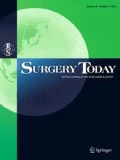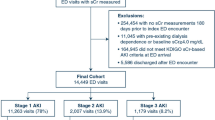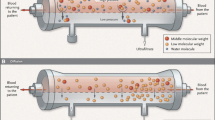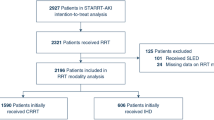Abstract
Purpose
The perioperative management of chronic kidney disease (CKD) patients undergoing open-heart surgery is challenging. In this study, we evaluated the effects of tolvaptan in CKD patients after open-heart surgery.
Methods
Between 2010 to 2015, 731 patients underwent open-heart surgery in our hospital. We consecutively selected 71 patients with stage IIIa–IV CKD and divided them into two groups. Those who received tolvaptan postoperatively were defined as the “Tolvaptan group” (n = 25) and those who did not were defined as the “Non-tolvaptan group” (n = 46). We compared the urine volume of postoperative days (POD) 1 and 2, the number of days to return to preoperative body weight (BW), and the change in the postoperative estimated glomerular filtration rate (eGFR).
Results
In the tolvaptan group, the urine volume was significantly larger (P = .04) and the duration to preoperative BW tended to be shorter. Overall, the postoperative change in the eGFR tended to be better in the tolvaptan group (P = .008). In particular, we found a significantly better trend in CKD stage IV (P = .04) patients and in the patients, whose cardiopulmonary bypass (CPB) time was longer than 120 min (P = .03).
Conclusions
Tolvaptan can safely be used for CKD patients undergoing open-heart surgery and can provide a feasible urine volume without leading to a deterioration of their renal function.




Similar content being viewed by others
References
El-Refai M, Krivospitskaya O, Peterson EL. Relationship of loop diuretic dosing and acute changes in renal function during hospitalization for heart failure. J Clin Exp Cardiolog. 2011;2:1–10.
Felker GM, O’Connor CM, Braunwald E. Loop diuretics in acute decompensated heart failure necessary? Evil? A necessary evil? Circ Hear Fail. 2009;2:56–62.
Vives M, Wijeysundera D, Marczin N, et al. Cardiac surgery-associated acute kidney injury. Interact CardioVasc Thorac Surg. 2014;18:637–45.
Landoni G, Biondi-Zoccai GGL, Marino G, et al. Fenoldopam reduces the need for renal replacement therapy and in-hospital death in cardiovascular surgery: a meta-analysis. J Cardiothorac Vasc Anesth. 2008;22:27–33.
Haase M, Haase-Fielitz A, Bellomo R, et al. Sodium bicarbonate to prevent increases in serum creatinine after cardiac surgery: a pilot double-blind, randomized controlled trial. Crit Care Med. 2009;37:39–47.
Sezai A, Shiono M, Orime Y, et al. Low-dose continuous infusion of human atrial natriuretic peptide during and after cardiac surgery. Ann Thorac Surg. 2000;69:732–8.
Otsuka T, Sakai Y, Ohno D, et al. The effects of tolvaptan on patients with severe chronic kidney disease complicated by congestive heart failure. Clin Exp Nephrol. 2013;17:834–8.
Gheorghiade M, Gattis WA, O’Connor CM, et al. Effects of tolvaptan, a vasopressin antagonist, in patients hospitalized with worsening heart failure: a randomized controlled trial. JAMA. 2004;291:1963–71.
Gheorghiade M, Orlandi C, Burnett JC, et al. Rationale and design of the multicenter, randomized, double-blind, placebo-controlled study to evaluate the efficacy of vasopressin antagonism in heart failure: outcome study with Tolvaptan (EVEREST). J Card Fail. 2005;11:260–9.
Onogawa T, Sakamoto Y, Nakamura S, et al. Effects of tolvaptan on systemic and renal hemodynamic function in dogs with congestive heart failure. Cardiovasc Drugs Ther. 2011;25(Suppl 1):S67–76.
Okada T, Sakaguchi T, Hatamura I, et al. Tolvaptan, a selective oral vasopressin V2 receptor antagonist, ameliorates podocyte injury in puromycin aminonucleoside nephrotic rats. Clin Exp Nephrol. 2009;13:438–46.
Higgins TL, Yared JP, Ryan T. Immediate postoperative care of cardiac surgical patients. J CardiothoracVascAnesth. 1996;10:643–58.
Bayliss J, Norell M, Canepa-Anson R, et al. Untreated heart failure: clinical and neuroendocrine effects of introducing diuretics. Br Heart J. 1987;57:17–22.
Lassnigg A, Donner E, Grubhofer G, et al. Lack of renoprotective effects of dopamine and furosemide during cardiac surgery. J Am Soc Nephrol. 2000;11:97–104.
Haga M, Hoshina K, Shigematsu K, Watanabe T. A perioperative strategy for abdominal aortic aneurysm in patients with chronic renal insufficiency. Surg Today. 2016;46(9):1062–7. doi:10.1007/s00595-015-1286-0.
Ellison DH. The physiologic basis of diuretic synergism: its role in treating diuretic resistance. Ann Intern Med. 1991;114:886–94.
Sezai A, Hata M, Niino T, et al. Results of low-dose human atrial natriuretic peptide infusion in nondialysis patients with chronic kidney disease undergoing coronary artery bypass grafting. J Am Coll Cardiol. 2011;58:897–903.
Felker GM, Lee KL, Bull DA, et al. Diuretic strategies in patients with acute decompensated heart failure. N Engl J Med. 2011;364:797–805.
Sirivella S, Gielchinsky I, Parsonnet V. Mannitol, furosemide, and dopamine infusion in postoperative renal failure complicating cardiac surgery. Ann Thorac Surg. 2000;69:501–6.
Hasselblad V, Stough WG, Shah MR, et al. Relation between dose of loop diuretics and outcomes in a heart failure population: results of the ESCAPE trial. Eur J Heart Fail. 2007;9:1064–9.
Rosner MH, Okusa MD. Acute kidney injury associated with cardiac surgery. Clin J Am Soc Nephrol. 2006;1:19–32.
Costello-Boerrigter LC, Smith WB, Boerrigter G, et al. Vasopressin-2-receptor antagonism augments water excretion without changes in renal hemodynamics or sodium and potassium excretion in human heart failure. Am J Physiol Renal Physiol. 2006;290:F273–8.
Mullens W, Abrahams Z, Francis GS, et al. Importance of venous congestion for worsening of renal function in advanced decompensated heart failure. J Am Coll Cardiol. 2009;53:589–96.
Srivastava V, D’Silva C, Tang A, et al. The impact of major perioperative renal insult on long-term renal function and survival after cardiac surgery. Interact CardioVasc Thorac Surg. 2012;15:14–7.
Hobson CE, Yavas S, Segal MS, et al. Acute kidney injury is associated with increased long-term mortality after cardiothoracic surgery. Circulation. 2009;119:2444–53.
Lassnigg A, Schmidlin D, Mouhieddine M, et al. Minimal changes of serum creatinine predict prognosis in patients after cardiothoracic surgery: a prospective cohort study. J Am Soc Nephrol. 2004;15:1597–605.
Coca SG, Singanamala S, Parikh CR. Chronic kidney disease after acute kidney injury: a systematic review and meta-analysis. Kidney Int. 2012;81:442–8.
Rifkin DE, Coca SG, Kalantar-Zadeh K. Does AKI truly lead to CKD? J Am Soc Nephrol. 2012;23:979–84.
Hsu C-Y. Yes, AKI truly leads to CKD. J Am Soc Nephrol. 2012;23:967–9.
Van Kuijk JP, Flu WJ, Chonchol M, et al. Temporary perioperative decline of renal function is an independent predictor for chronic kidney disease. Clin J Am Soc Nephrol. 2010;5:1198–204.
Ishani A, Xue JL, Himmelfarb J, et al. Acute kidney injury increases risk of ESRD among elderly. J Am Soc Nephrol. 2009;20:223–8.
Kirklin JK, Westaby S, Blackstone EH, et al. Complement and the damaging effects of cardiopulmonary bypass. J Thorac Cardiovasc Surg. 1983;86:845–57.
Wald R, Liangos O, Perianayagam MC, et al. Plasma cystatin C and acute kidney injury after cardiopulmonary bypass. Clin J Am Soc Nephrol. 2010;5:1373–9.
Oda T, Matsumoto K. Proteomic analysis in cardiovascular research. Surg Today. 2015;46:1–12.
Author information
Authors and Affiliations
Corresponding author
Ethics declarations
Conflict of interest
HN received lecture fees and travel expenses from Otsuka Pharmaceutical.
Rights and permissions
About this article
Cite this article
Yamada, M., Nishi, H., Sekiya, N. et al. The efficacy of tolvaptan in the perioperative management of chronic kidney disease patients undergoing open-heart surgery. Surg Today 47, 498–505 (2017). https://doi.org/10.1007/s00595-016-1406-5
Received:
Accepted:
Published:
Issue Date:
DOI: https://doi.org/10.1007/s00595-016-1406-5




